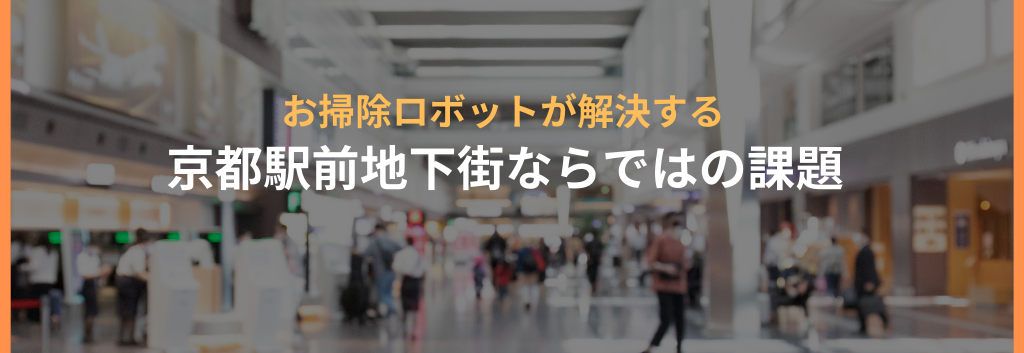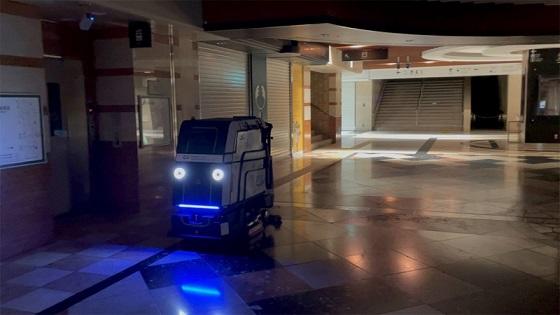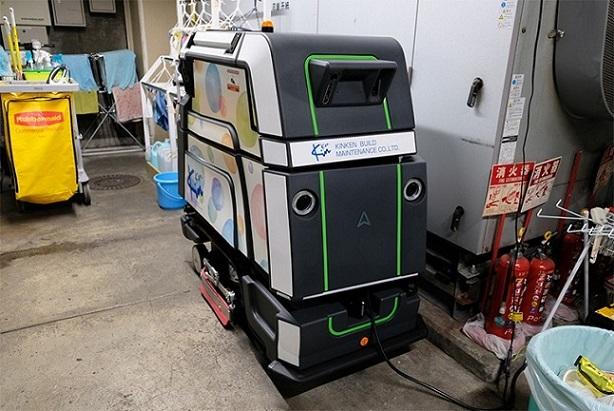
This article was published in the Nikkan Kogyo Shimbun on February 15, 2022. We have permission to post from NIKKAN KOGYO SHIMBUN,LTD.

An automatic cleaning robot spends three hours going around the vast floor at night.
Kyoto has some of the most famous tourist attractions in Japan. The automatic cleaning robot "Neo 2" made by Canada's Avidbots started working at the gateway to Kyoto Station, "Porta," in January.
Board Director Takayuki Tamura of the Kyoto Station Center (Shimogyo Ward, Kyoto City), who introduced the system, praises it highly, saying, "The way they work hard is adorable."
In the background of the introduction, there were problems unique to the underground shopping area in front of Kyoto Station, such as the difficulty of cleaning the crowded passages and the lack of personnel. (Ai Okawa, Osaka)
1 am. When the security staff pushed the button, Neo2 started to move quietly. It takes three hours to cover half of the vast floor area of 12,700 square meters.
"The work that used to take two people three or four days can be completed in two days with one machine," said Board Director Tamura, contributing greatly to improving work efficiency.
The underground shopping mall in front of Kyoto Station is used not only by tourists but also by commuters to transfer trains, etc. "Before the corona crisis, it was necessary to clean it as 100,000 to 120,000 people walked every day," he said.
It is said that even during the corona crisis, working in a crowd was a heavy burden for employees.
``If you try to work at night, you won't be able to get enough people,'' he said, and he found a robot as a solution.
Neo2 operates at a maximum speed of 4.86 kilometers, which is about the speed of a person's brisk walking. In addition, once mapping is done to determine the movement route, detailed corrections can be made remotely, and the ability to detect and avoid obstacles is high, so there is no need to stop during cleaning.
It was highly evaluated for its ability to respond to the unique circumstances of underground shopping malls, where the layout changes frequently.

Neo2 began operation in January at Porta, an underground mall in front of Kyoto Station.
In addition, although "one of the focuses was whether it could overcome the braille block", the problem was cleared after the demonstration experiment. Regarding the load capacity, which was a concern, it is said that it can be operated without affecting the natural stone tiles.
The introduction of robots has been under consideration since 2019, and although several operators have been compared, it has been difficult to introduce robots in terms of cost effectiveness and maintenance. As Neo2 began to be adopted by domestic department stores, etc., it is said that talks about introducing it progressed, ``the case was the decisive factor'' (same).
Few failures and ease of handling were also important criteria.
Due to the increase in inbound tourists (foreigners visiting Japan) in Kyoto, the demand for hotel cleaning is also increasing. With the spread of COVID-19 tourism-related businesses are becoming increasingly concerned that "if the use of hotels is revived, it won't be enough (to manage human resources)." It often takes time to acquire cleaning skills, and the period of human resource development is also an issue.
The introduction of robots is an important option as one of the solutions to reduce the burden on employees and business partners.
In the future, the Kyoto Station Center will consider introducing an artificial intelligence (AI) concierge to the information desk.
The company plans to use robots complementarily in tasks that require advanced skills, such as providing various tourist information and guidance in multiple languages, to enhance its services.
Case study
On the following page, we introduce a case study of KINKEN BUILD MAINTENANCE.CO.,LTD. was introduced to the underground shopping mall "Porta" in front of Kyoto Station.
Please take a look.
